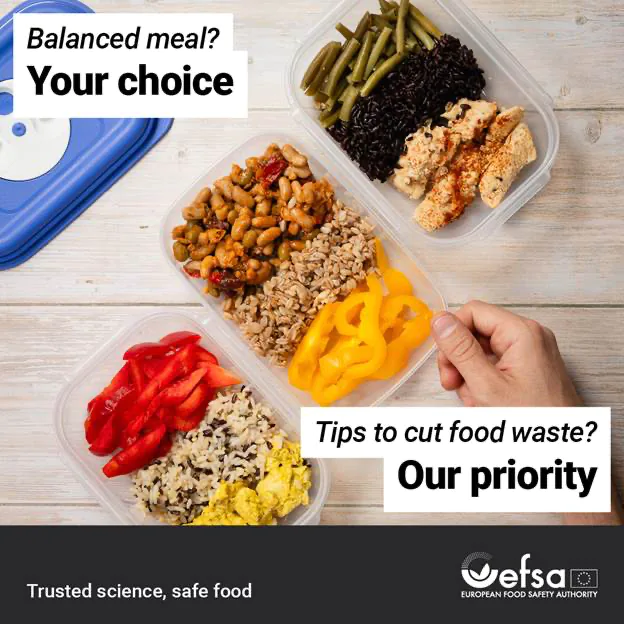European Food Safety Authority (EFSA) and Croatian Agency for Agriculture and Food (HAPIH) have announced the beginning of an educational campaign, whose main objective is to inform the consumers about food safety and encourage them to critically choose what they eat, as well as to strenghten their trust in EU food safety system, which guarantees that food in Croatia and entire European Union is safe for consumption. Campaign will also deal with the topic of so-called greenwashing in food industry, i.e. the practice of falsely advertising products as eco-friendly.
HAPIH, in cooperation with EFSA, as the European Union’s highest advisory authority in the field of food safety, and with the support of the Ministry of Agriculture and other institutional partners in Croatia, will provide consumers, in a simple and easy-to-understand manner, with often complex information about food safety, and explain the science behind the food they consume. Under the name “Safe2Eat”, the campaign will be implemented in Croatia and sixteen other EU member states in the upcoming months.
“Educating consumers about food safety is not only our duty, but also a key aspect in the protection and promotion of public health, as well as environmental protection. Only well-informed consumers can make correct and reliable decisions when buying, preparing and consuming food. With this campaign, we want to help them in this, and encourage them to think about food safety and potential risks, but also about how their daily choices affect their health and the environment. Education about food safety is a continuous process, which is why we are conducting this campaign now for the fourth year. We appeal to everyone to think about the food they consume,” stated associate professor Darja Sokolić, Ph.D, director of HAPIH.
A part of this campaign is focusing on recognition of greenwashing in the food industry, i.e. deceiving the consumers into thinking that certain products are more eco-friendly than others, in order to make them more appealing to the consumers.
“Informing consumers about food, whether pre-packaged or not, is the most important form of communication by food business operators, both producers, retailers and hospitality workers, and is also one of the most complex legally regulated areas related to food. Croatia, like the entire European Union, has a clearly regulated system in the context of product labeling. However, we have witnessed that sometimes green color or images of nature are used on products to imply sustainability, wanting to create an impression among consumers that these products are more environmentally sustainable than they actually are. That’s why we want to educate them to read declarations carefully, so that they can make informed decisions and choose truly sustainable products”, Sokolić points out.
Given the EU food safety system is among the strictest in the world, European consumers are the best protected, but also informed when it comes to their food.
“Every day, citizens across Europe choose what to buy and eat, taking into account various factors such as price, taste, sustainability and origin. Thanks to the high standards of food safety in the EU, they can be sure that, regardless of their choices, the food they buy and consume is safe to eat. The goal of the “Safe2Eat” campaign is to connect the science of food safety with food that ends up on our plates, enabling people to make safe food decisions”, said Bernhard Url, EFSA’s executive director.
The need for consumer education is confirmed by the results of the latest Eurobarometer on food safety in the EU from 2022, which show that almost a third (31 percent) of Croatian citizens believe that the available information on food safety is too technical and complex, and 34 percent take it for granted, believing almost all the food that is sold is safe. Domestic consumers’ decisions when buying food are most influenced by price (62 percent) and food safety (61 percent), followed by food origin (49 percent) and taste (44 percent). Nutritional value is considered important by 36 percent of consumers in Croatia, and only 9 percent of them think about its effect on the environment and climate when buying food.
In its fourth year, the Safe2Eat campaign will focus on understanding food labels, food handling, foodborne diseases, food recycling and promoting practices that can reduce food waste. The campaign will also touch upon the issue of novel food, allergens in food, as well as nutritional supplements.
The efforts of HAPIH and EFSA in educating consumers about food safety are supported in partnership with the Ministry of Agriculture, the Ministry of Health, the Faculty of Food Technology and Biotechnology of the University of Zagreb, the Faculty of Food Technology Osijek, the Faculty of Agrobiotechnical Sciences Osijek, the Veterinary Faculty of the University of Zagreb, the Croatian Chamber of Commerce, Croatian Institute for Public Health, Teaching Institute for Public Health “dr. Andrija Štampar”, Croatian Association of Nutritionists, Center for Consumer Education and Information, European Center for Consumer Excellence Zagreb and Hospitality and Tourism School in Osijek.
Along with Croatia, the educational campaign will be implemented simultaneously in Romania, the Czech Republic, Hungary, Greece, Estonia, Italy, Latvia, Cyprus, Slovenia, Spain, Luxembourg, Slovakia, Austria, Poland, Portugal, and North Macedonia.
More detailed information on food safety topics and useful tips can be found on the “Safe2Eat” campaign website.
